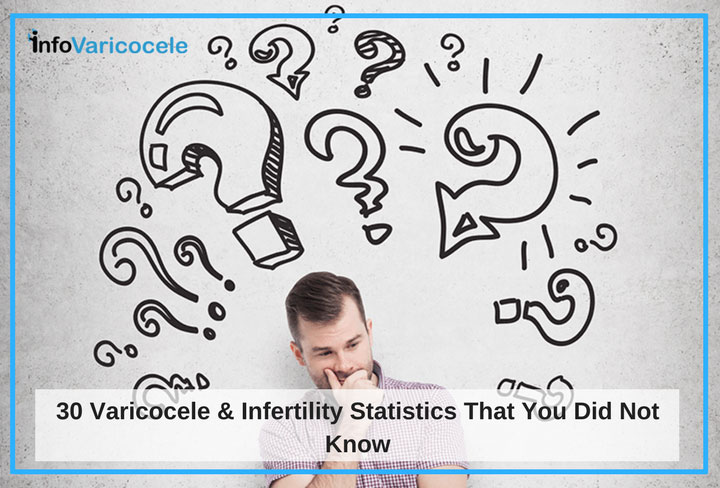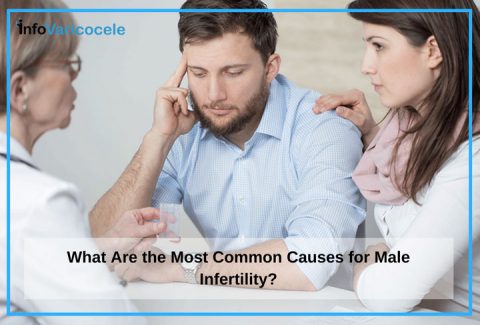
Couples having difficulty getting pregnant should be aware that fertility problems can be male oriented. One of the possible factors contributing to male infertility may be related to a condition known as varicocele, which is essentially a varicose vein in the testicle or scrotum. Doctors have confirmed a link between the dysfunctional veins caused by varicocele and infertility.
While there are surgical options for varicocele infertility treatment, there is also a non-surgical option known as varicocele embolization. If you’re interested in this minimally invasive alternative to surgery, you should ask your doctor about it. If you are interested in varicocele embolization, you will need to see an interventional radiologist to perform the procedure. Want to know more? Listed below are 30 varicocele infertility factors you may not know.
How Does Varicocele Affect Fertility?
- A varicocele causes an increase in the temperature of the testicles, which affects sperm development.[i]
- Sperm counts decrease by an estimated 40% for every degree the testicles rise in temperature.[ii]
- A low sperm count is the most common cause of male infertility.[iii]
- A varicocele may cause DNA damage in sperm. This DNA damage in sperm occurs more often in men with varicocele than in men without.[iv]
- Abnormal sperm can be caused by testicular inflammation, swollen (varicose) veins in the scrotum, and abnormally developed testicles.[v]
- Varicocele is related to lower testosterone levels, which may result in a number of long-term health conditions and can also affect sex drive.[vi]
- Varicocele causes lower semen quality. This doesn’t allow good, quality sperm to thrive.[vii]
- Lower semen quality occurs when there is an imbalance between “free radicals” and antioxidants. This imbalance of increased free radicals and decreased antioxidants is common in men with varicocele.[viii] Because it is typically affected, semen quality will be tested first as a part of fertility testing.[ix]
Who Is Affected by Varicocele?
- Statistics show 15 percent of couples face fertility problems. Infertility is determined if a couple does not conceive a child after one year of unprotected sex.
- Male factor infertility is solely responsible in about 20% of infertile couples and contributory in another 30-40%.[x]
- Varicocele is considered by doctors to be a primary factor in 81 percent of infertility cases where couples are attempting to have a second child.[xi]
- Varicocele is not believed to be genetic.
- Varicocele formation often begins in adolescence.
- Varicocele can happen as the result of trauma, such as an accident.[xii]
What Are Other Characteristics of Varicocele?
- One testicle may to be larger than the other.
- There can be pain, particularly when lifting.
- Blood vessels may be visible.
- The left testicle is most often affected.
How Can Varicocele Embolization Help?
- Varicocele embolization immediately restores blood flow to healthy veins.
- Testicles may return to a normal size.
- There may be an increase in sperm count.[xiii]
- Sperm quality may improve. [xiii]
- Semen quality improves in the majority of men.[xiv]
- You can resume normal sexual activities within 2 days – 2 weeks after embolization.
- 30% – 50% of couples undergoing embolization achieve a spontaneous pregnancy after the procedure.[xv]
- It can take about 3 months for sperm count to improve.[xvi]
- Varicocele infertility stats suggest that the chance of successful conception increases substantially in the second year after the surgery.
- Chance of successful conception increases after the first child is born.[xvii]
- Varicocele embolization improves chances of successful conception if a couple is using a medical procedure, such as in vitro fertilization (IVF), to conceive.[xviii]
- Studies have shown promising results for embolization as treatment for recurrent varicoceles. One study showed an overall 93% success rate, with 80% of men having a complete resolution.[xix]
Men sometimes have a difficult time dealing with an infertility diagnosis. Although men feel the same type of grief that women experience with such news, it’s not uncommon for them to hide their emotions, leading to verbal bursts of anger or grief.[xx] The good news is a diagnosis of male factor infertility due to varicocele doesn’t mean you will never be a father. Today, there are minimally invasive treatment options available, like varicocele embolization, which may increase your chances of conception.
Sources:
[i] http://www.ncbi.nlm.nih.gov/pmc/articles/PMC2664231/
[ii] http://www.parentingweekly.com/preconception/preconception_information/heat_and_male_infertility.htm
[iii] http://www.mayoclinic.org/diseasesconditions/varicocele/basics/complications/con-20024164
[iv] http://www.ncbi.nlm.nih.gov/pubmed/22809864
[v] http://americanpregnancy.org/infertility/male-infertility/
[vi] http://www.nyp.org/news/hospital/goldstein-varicoceles-testosterone.html
[vii] http://www.ncbi.nlm.nih.gov/pmc/articles/PMC3249911/
[viii] http://resolve.org/about-infertility/medical-conditions/male-factor-infertility-how-varicocele-repair-can-be-an-effective-treatment.html
[ix] http://www.webmd.com/infertility-and-reproduction/varicocele-repair-for-infertility
[x] https://www.auanet.org/education/guidelines/male-infertility-d.cfm
[xi] http://www.ncbi.nlm.nih.gov/pmc/articles/PMC2664231/
[xii] http://en.allexperts.com/q/Urology-Male-issues-989/2009/12/traumatic-varicocele.htm
[xiii] http://resolve.org/about-infertility/medical-conditions/male-factor-infertility-how-varicocele-repair-can-be-an-effective-treatment.html
[xiv] http://www.urologyhealth.org/urologic-conditions/varicoceles/after-treatment
[xv] http://varicoceles.com/f-a-q-s/
[xvi] 4163-01_DH-Varicocele-Brochure-07.pdf
[xvii] http://www.urologyhealth.org/urologic-conditions/varicoceles/after-treatment
[xviii] http://www.webmd.com/infertility-and-reproduction/varicocele-repair-for-infertility
[xix] Kim, J., Shin, J. H., Yoon, H. K., Ko, G. Y., Gwon, D. I., Kim, E. Y., & Sung, K. B. (2012). Persistent or recurrent varicocoele after failed varicocoelectomy: outcome in patients treated using percutaneous transcatheter embolization. Clinical Radiology, 67(4), 359–65. doi:10.1016/j.crad.2011.10.007
[xx] http://www.resolve.org/about-infertility/medical-conditions/men-and-emotions.html?referrer=https://www.google.com/


